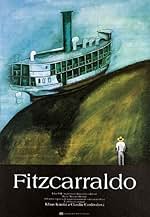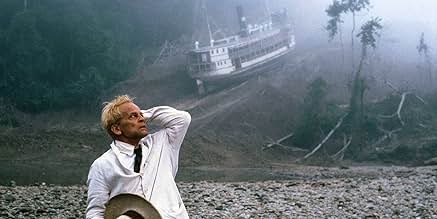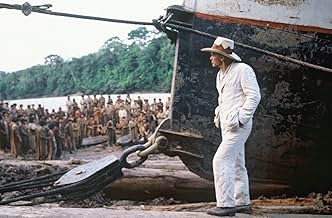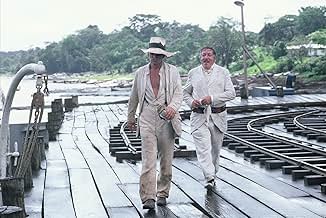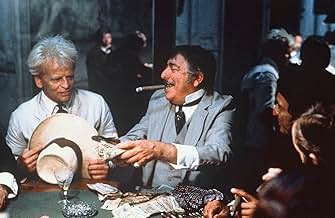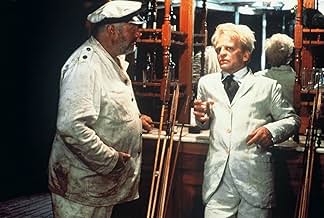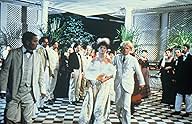A história de Brian Sweeney Fitzgerald, um homem extremamente determinado que pretende construir uma casa de ópera no meio da selva.A história de Brian Sweeney Fitzgerald, um homem extremamente determinado que pretende construir uma casa de ópera no meio da selva.A história de Brian Sweeney Fitzgerald, um homem extremamente determinado que pretende construir uma casa de ópera no meio da selva.
- Indicado para 1 prêmio BAFTA
- 4 vitórias e 4 indicações no total
- Cholo
- (as Miguel Angel Fuentes)
- Huerequeque (The Cook)
- (as Huerequeque Enrique Bohórquez)
- Station master
- (as Grande Othelo)
- Rubber Baron
- (as Rui Polanah)
- Old Missionary
- (as Salvador Godinez)
- Notary
- (as Bill Rose)
- Opera Singer
- (não creditado)
- Opera Singer
- (não creditado)
- Wilbur (scene cut)
- (não creditado)
Avaliações em destaque
With his white coat, white hat, and his bleached blonde hair, Fitz is quite an eccentric. In a social context, he's an outsider. But he has a bold vision. His romantic sidekick is a woman named Molly (Claudia Cardinale). As a compliment to Fitz, she speaks the film's theme: "It's only the dreamers who move mountains".
After some preparation early in the film, Fitz and crew set sail up the Amazon on a huge boat, to stake out a claim for their business that will bring in the money to advance Fitzcarraldo's dream. The boat is equipped with all the necessities, which include, naturally, a gramophone to play the operatic music of Enrico Caruso. And the best sequences of the film are those set in the remote jungle, as the boat moves through a large tributary of the Amazon, into headhunter territory. With the gramophone blaring out opera amid the sound of Indian war drums, it's the unusual contrast between the primitive and the cultural that makes this film interesting.
Filmed entirely in South America, the story is set in the early years of the twentieth century, long before the advent of television or automobiles.
Color cinematography is quite good. This is a very physical story. Most scenes take place outdoors. And the remoteness of the setting conveys a sense of doom, a sense of unknown terror and foreboding.
While the visuals are stunning, some aspects of the story I'm just not sure about. I never did figure out the significance of the ice. Is that a reward for Indian cooperation? If so, how can ice be preserved in a land without electricity? And without electricity, isn't the whole idea of an opera house in the wilderness a tad ludicrous? Maybe these questions are all answered and I just missed them. Even so, these issues could have been better addressed in the script.
Not as deeply thematic as "Aguirre: The Wrath Of God" (1972), Werner Herzog's "Fitzcarraldo" nevertheless is an unusual film, one that is worth watching for its stunning visuals and thematic contrasts, its physicality, and the eccentric character of Fitzcarraldo, the dreamer who can move mountains.
So begins the prologue to Werner Herzog's 'Conquest of the Useless,' a compilation of diary entries the director made while shooting 'Fitzcarraldo,' considered by many to be his magnum opus. The film follows Brian Sweeney Fitzgerald- known as Fitzcarraldo- a determined entrepreneur living in Iquitos, Peru. Inspired to attempt the impossible, he plans to haul a 365-tonne steamship over a mountain deep in the jungle, in order to harvest rubber; thereby making enough money to build an opera house in Iquitos. Against the raw power of nature, as well as the machinations of a local tribe, will Fitzcarraldo be successful, or will his scheme prove to be unachievable?
A fascinating, endlessly rewarding piece of work, 'Fitzcarraldo' is a compelling tale examining a multitude of themes. It is a portrait of man's resilience, as well as a metaphor for the human condition and the unwavering struggle to realize one's dreams, no matter how impossible- and improbable- they seem. A profound character study- as well as a thrilling, beautifully shot meditation on the clash between man and nature- there are few films like it; and very few people like its director.
It is a fever dream of ambition. Fitzcarraldo's plan defies reason. As the steamship strains against nature's fury, it becomes more than a mechanical marvel; embodying the indomitable human spirit. Inching upward, it symbolizes man's collective audacity- the relentless pursuit of dreams against all odds. The jungle landscape, meanwhile, is not merely a physical obstacle; it symbolizes internal, as well as external, challenges; be they Fitzcarraldo's inner struggles, doubts or the psychological hurdles he faces on his quest. Its lush greenery conceals danger, while its rivers teem with life and death. Herzog expertly captures the landscape's primal energy- the rustling leaves, the cacophony of unseen creatures- mirroring Fitzcarraldo's inner turmoil.
As the film progresses, the steamship becomes a character in its own right, a symbol of human ambition and folly. The arduous journey up the mountain is fraught with setbacks and challenges, each more daunting than the last. Herzog's direction is unflinching; he does not shy away from the harsh realities of the endeavour, nor does he romanticize Fitzcarraldo's mission. The result is a raw and unvarnished look at the lengths to which one man will go to, to realize his dream.
Moreover, behind the camera, Herzog's commitment to authenticity and his determination to finish the film mirror's his titular character's quest; blurring the line between fiction and reality. He dragged a real steamship over a real mountain, echoing Fitzcarraldo's unwavering belief in- and pursuit of- the impossible. Herzog and his team endured myriad of struggles trying to get the film made, from cast changes to near-fatal accidents. Although he often refers to himself as "clinically sane," with regard to this film, Herzog's total obsession is palpable.
Under Herzog's direction, Thomas Mauch's cinematography is evocative and stunning. Mauch captures the dual sides of the jungle astutely, showing its beauty, as well as its darkness. His clever framing of the steamship highlights the impossibility of Fitzcarraldo's plans, while also serving as a visual metaphor, emphasising the overwhelming power of nature. The jungle surrounds all, dwarfing both man and machine; highlighting the struggle of the individual against an untamed world.
Alongside Mauch's visuals, Popol Vuh's score compounds the dreamlike quality of the narrative. Classic pieces by the likes of Puccini and Verdi are implemented brilliantly, heightening the juxtaposition between the barbarity of nature and the supposed order of man. Epic and distinct, Popol Vuh's original melodies intensify the jungle scenes and underscore Fitzcarraldo's emotional journey. Combined with Mauch's imagery, the score evokes a sense of timelessness, creating a mesmerising audio/visual tapestry that enchants the viewer; weaving threads of eternity into the fabric of Fitzcarraldo's journey.
Furthermore, the production design- from Ulrich Bergfelder and Henning von Gierke- is authentic and atmospheric. Their meticulous attention to detail in the steamship's construction and the recreation of Iquitos captures the era's spirit, enhancing the film's immersive quality. The design team's efforts to authentically depict the Peruvian jungle's daunting environment adds a layer of realism to Fitzcarraldo's quixotic adventure.
Meanwhile, Beate Mainka-Jellinghaus's seamless editing allows the narrative to unfold with a rhythm that mirrors the ebb and flow of the Amazon River itself. This serves to accentuate the contrast between the chaotic jungle and the protagonist's inner turmoil, while also maintaining the suspense that drives Fitzcarraldo's obsessive quest forward. Additionally, Gisela Storch's striking costume design adds depth to the film's visual language, contributing to the overall tapestry of Herzog's ambitious vision.
Klaus Kinski stars as Fitzcarraldo, supported by Claudia Cardinale, Paul Hittscher, José Lewgoy and Miguel Ángel Fuentes. Initially, Jason Robards was cast as the titular character, though left the production soon after encountering the intensity of the Peruvian jungle. Although Herzog flirted with playing the part himself, Kinski was eventually brought on board. As the maniacally determined entrepreneur, Kinski delivers a powerhouse performance, bringing to life perfectly a man of great obsession. Madly magnetic, it is arguably the highlight of his career.
As Molly, Fitzcarraldo's business partner and love interest, Cardinale oozes sophistication and decency. Despite the fact that she has relatively little screen time, Cardinale is excellent, leaving an indelible impression on the viewer. Hittscher and Fuentes both do strong work as members of the steamship's crew, while Lewgoy brings a welcome light energy to his role as a businessman who sparks Fitzcarraldo's interest in the rubber trade.
'Fitzcarraldo' is a fascinating film, an adventure into the Peruvian jungle and the mind of an obsessive personality. Written and directed by the incomparable Werner Herzog, it is impossible to forget, containing imagery and examining themes that stir the soul. Boasting an effective score, detailed production design and powerhouse performances from all in the cast- led by a pitch perfect Klaus Kinski- it is a fever dream you'll always remember.
This seems especially true of "Fitzcarraldo," which, sets a hundred years ago, begins with an Irish colonist who had a passion for opera rowing 1,200 miles down a South American river, accompanied by the madam of a brothel, in order to hear the great Caruso perform
Inspired by this experience, Fitzcarraldo embarks on a grandiose plan to open up the Amazonian jungle to river transport, providing access to new rubber plantations and thereby making enough money to build an opera house
Herzog's favorite actor, Klaus Kinski, is as appropriately manic as Fitzcarraldo, eyes glittering madly as he pursues his vision In the central sequence he organizes a tribe of Indians to help him pull a steamboat across a mountain in order to by-pass dangerous rapids
"Fitcarraldo" seems by turns admiring of its hero's megalomania and mocking of his hubris, with no illusions about the cynical exploitation of the region's riches by the rubber barons whom Fitzcarraldo tries to defeat by cleverness Ultimately though, it is the sheer spectacle which we remember
Você sabia?
- CuriosidadesKlaus Kinski was a major source of tension on set, because he fought violently with the crew and raged over trivial matters. The natives were very upset about his behavior. Werner Herzog has claimed that one of the chieftains offered, in all seriousness, to murder Kinski. However, Walter Saxer, the production manager of this film, later confirmed that Herzog's story was not true.
- Erros de gravaçãoDuring one of boat drifting scene, crew members are visible at the top of the boat, including a man in jeans who tries to avoid the camera.
- Citações
Brian Sweeney Fitzgerald - 'Fitzcarraldo': How can anyone learn patriotism from a school book?
Young Missionary: The Government requires it.
Old Missionary: The natives get used to it. Like vaccination.
Young Missionary: The children already feel like little Peruvians. The other day I asked them, "Are you Indians?" "No," they said, "not we, the ones up the river, they are Indians." And then I asked. "What are Indians?" "They said to me "Indians are people who can't read and who don't know how to wash their clothes."
Brian Sweeney Fitzgerald - 'Fitzcarraldo': And what about the older people?
Old Missionary: Well, we can't seem to cure them of the idea that our everyday life is only an illusion, behind which lies the reality of dreams.
Brian Sweeney Fitzgerald - 'Fitzcarraldo': Actually, I'm very interested in these ideas. I specialise in opera myself.
- ConexõesEdited into Spisok korabley (2008)
- Trilhas sonorasOpera in Manaos
from "Ernani" by Giuseppe Verdi
Production: Werner Schroeter
Ernani: Veriano Luchetti (voice)
Costante Moret (actor)
Silva: Dimiter Petkov (voice and actor)
Elvira: Mietta Sighele (voice)
Singer at orchestra: Lourdes Magalhaes
Sarah Bernhardt: Jean-Claude Dreyfus (as Jean-Claude Dreyfuss)
Stage design: Gianni Ratto
Orchestra of the Filarmonica Veneta
Conducted by Giorgio Croci
Principais escolhas
- How long is Fitzcarraldo?Fornecido pela Alexa
Detalhes
- Data de lançamento
- Países de origem
- Idiomas
- Também conhecido como
- Фіцкарральдо
- Locações de filme
- Plaza de Armas, Iquitos, Peru(Fitzcarraldo's house)
- Empresas de produção
- Consulte mais créditos da empresa na IMDbPro
Bilheteria
- Orçamento
- DEM 14.000.000 (estimativa)
- Faturamento bruto mundial
- US$ 4.475

